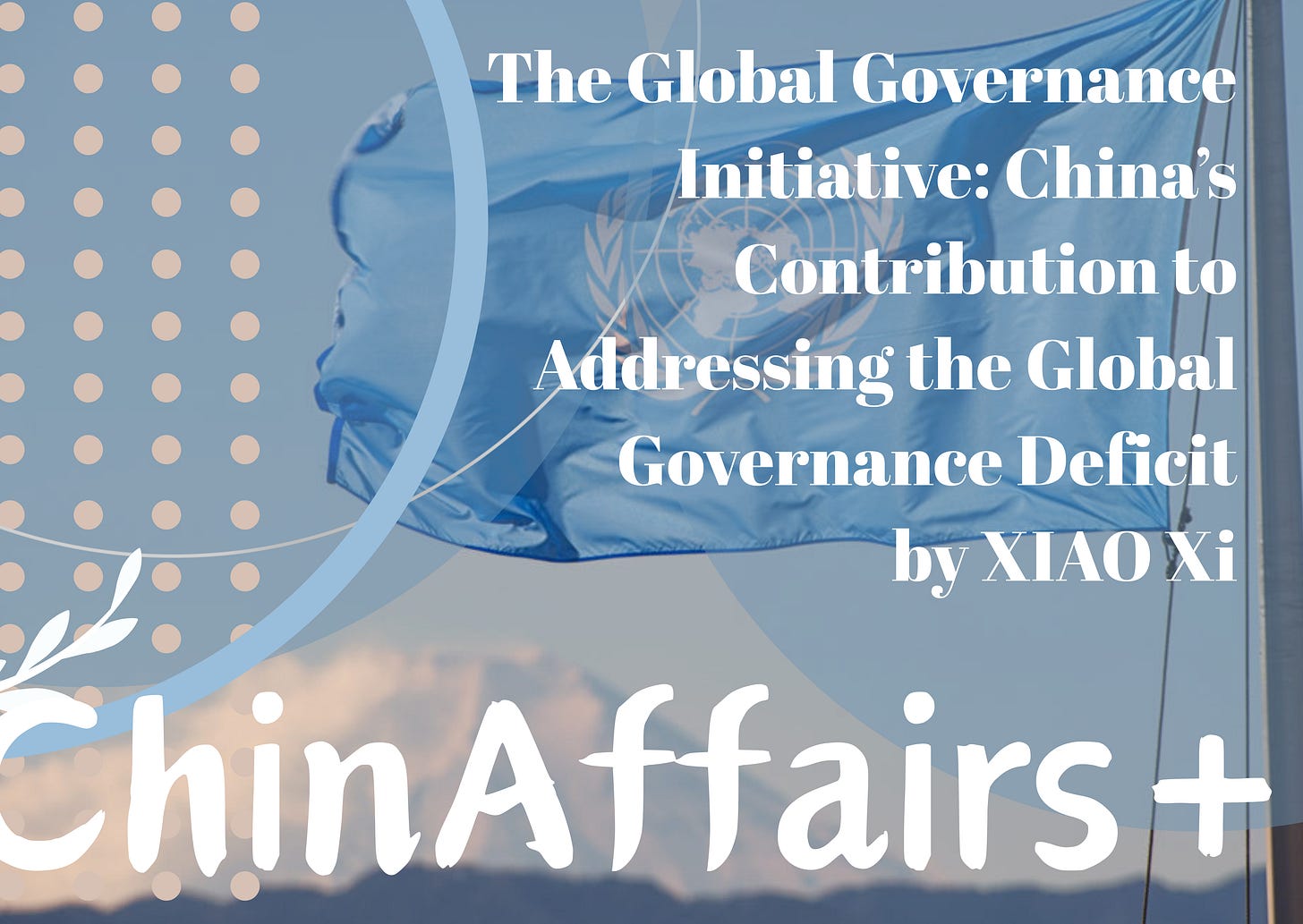The Global Governance Initiative: China’s Contribution to Addressing the Global Governance Deficit by XIAO Xi
Looking ahead, the key to the effective implementation and success of the Global Governance Initiative lies in the ability of the international community to genuinely foster consensus and forge ahead.
Welcome to the 54th edition of our weekly newsletter! I’m SUN Chenghao, a fellow with the Center for International Security and Strategy (CISS) at Tsinghua University, Council Member of The Chinese Association of American Studies, a visiting scholar at Paul Tsai China Center of Yale Law School in 2024 and a Munich Young Leader 2025.
ChinAffairsplus is a newsletter that shares articles by Chinese academics on topics such as China’s foreign policy, China-U.S. relations, China-Europe relations, and more. This newsletter was co-founded by my research assistant, ZHANG Xueyu, and me.
Through carefully selected Chinese academic articles, we aim to provide you with key insights into the issues that China’s academic and strategic communities are focused on. We will highlight why each article matters and the most important takeaways. Questions and feedback can be addressed to sch0625@gmail.com
Today, we have selected an article written by XIAO Xi on The Global Governance Initiative: China’s Contribution to Addressing the Global Governance Deficit.
Summary
The Global Governance Initiative constitutes a much-needed international public good provided by China to address the global governance deficit. The accelerated evolution of profound changes unseen in a century is fueling a sharp increase in global challenges, which are characterized by growing complexity and expanding negative feedback loops.
Against this backdrop, the Global Governance Initiative, adhering to the principle of sovereign equality as its premise, relying on international rule of law as its safeguard, centering on multilateralism, and pursuing people-oriented governance goals with an action-oriented approach, offers Chinese wisdom and solutions for resolving the global governance deficit.
Furthermore, the proposal of this Initiative facilitates the comprehensive implementation of the “Three Global Initiatives,” contributes to building a fair and equitable global governance system, and accelerates the realization of a community with a shared future for mankind.
Why It Matters
At the 2025 “Shanghai Cooperation Organization Plus” (SCO+) Summit, Chinese President Xi put forward the Global Governance Initiative (GGI). This initiative not only represents the ideas reflected in the Global Development Initiative (GDI), the Global Security Initiative (GSI), and the Global Civilization Initiative (GCI) — collectively referred to as the “Three Global Initiatives” — but also realizes, both in terms of ideology and practice, an in-depth advancement and elevation from focusing on specific fields to addressing the governance system as a whole.
While the “Three Global Initiatives” center on specific governance areas such as development, security, and cultural exchanges, the GGI anchors the direction, principles, and pathways for the reform of global governance systems and mechanisms, demonstrating distinct normative significance and practical value. In view of this, it is necessary for us to conduct a systematic analysis of the GGI to help integrate the theory and practice of China’s major-power diplomacy with Chinese characteristics and develop an independent epistemology for Chinese philosophy and social sciences.
This paper intends to address the following questions: What is the background of the GGI? What are the unique features of its value system and institutional design? And how does it promote the democratization of international relations and the reform of the global governance system in practice?
Key Points
1. The Exacerbation the Global Governance Deficit by 21st Century Transformations
First, there has been a sharp increase in global challenges, marked by growing complexity and negative impacts with greater reverberation.
(1)The Proliferation of Global Issues
On the economic development front, the frequent initiation of trade wars by the United States, involving the imposition of high tariffs on numerous countries, has hindered global economic and trade cooperation and led to sluggish economic growth. Simultaneously, efforts to contain China technologically have heightened the risks of decoupling and disruption within global technology supply and within industrial and value chains, obstructing global technological progress.
In terms of security, numerous traditional security issues—such as strategic rivalry and confrontation among major powers, political instability in fragile states, and regional conflicts—flare up frequently. Meanwhile, non-traditional security threats—including economic recessions, legal conflicts, terrorism, transnational crime, cultural and civilizational clashes, ecological degradation, and public health crises—have intensified dramatically. These diverse security challenges are increasingly interwoven.
On the civilizational level, ideological confrontations are resurfacing, with the United States attempting to create global divisions and opposition based on differences in political systems and values. Some Western countries, led by the U.S., continue to promote a diplomacy based on “universal values,” undermining global civilizational diversity and exacerbating estrangement and conflict among civilizations.
(2) Growing Complexity
Global issues transcend domestic and international boundaries and involve an increasingly complex and diverse set of contributing factors. Furthermore, these problems interact with and evolve from one another, resulting increasingly protracted and persistent negative repurcussions.
(3) Expanding Negative Repercussions
For instance, the COVID-19 pandemic, the Russia-Ukraine conflict, and the Israel-Palestine conflict have severely impacted the international political and economic order, resulting in significant loss of life and property damage. Consequently, populist, unilateralist, and nationalist sentiments have gained traction in some countries, seriously hindering the process of globalization.
Second, western countries are using various means to obstruct the transformation of the global governance system towards greater fairness and equity.
(1) Active Undermining of the Existing System
Since the 2008 financial crisis, frequent internal governance crises and prevalent populism within western states have led countries, primarily the United States, to frequently “withdraw from international organizations” and “form exclusive cliques,” severely damaging the global governance architecture.
(2) Shirking Global Governance Responsibilities
As the world enters a period of turbulence and transformation, global challenges are multiplying rapidly. In response, western countries are not actively fulfilling their corresponding governance responsibilities but are instead evading them, resulting in a severe shortage of global public goods and worsening the international situation.
(3) Attempting to Maintain a Dominant Position for Self-Interested Reasons
Faced with rising calls for reform of the global governance system, western countries are vigorously preventing Global South states from participating in this reform process. They strive to dominate the reshaping of a global governance system in ways favorable to their own interests. That is, by maintaining their discourse power and hegemony within the global governance system.
Third, the global governance deficit is becoming increasingly pronounced.
Firstly, the sharp increase in global problems and their complexity starkly contrast with the lagging development of global governance institutions. This overloads the existing system’s capacity, making it inadequate to meet the growing demands for global governance. Secondly, western countries, perceiving themselves as no longer the primary beneficiaries of globalization, are reluctant to continue providing global public goods that allow developing countries to “free-ride.” Moreover, they not only refrain from participating in global governance cooperation schemes proposed and advanced by emerging countries but also engage in subversive activities aimed at disrupting these efforts. Thirdly, statism, bloc politics, and regionalism are becoming more pronounced within global governance. This leads to overlapping, substitutive, and redundant international governance institutions and mechanisms, intensifying disorderly competition in global governance.
2. The Global Governance Initiative: China’s Approach to Resolving the Global Governance Deficit
The Global Governance Initiative systematically addresses the fundamental questions of global governance—“by whom, how, and for whom it is conducted”—responding to the concerns of the international community and presenting itself as the correct choice for tackling global challenges and the essential path to resolving the governance deficit.
It adheres to the premise of sovereign equality.
All countries, regardless of size, strength, or wealth, should participate jointly in global governance decision-making to foster broader consensus and more scientific solutions. They should engage collectively in governance practices to pool more resources and create synergistic efforts. All parties should enjoy benefits from global governance that correspond to their contributions in order to ensure its sustainable development.
It insists on the safeguarding of international rule of law.
This involves upholding the basic norms of international relations recognized by international law, with the purposes and principles of the UN Charter at its core, to promote a stable evolution of the international order. It ensures that international law and rules are applied equally and uniformly to all countries, avoiding the practice of institutional “double standards” that benefit some states at the expense of others. The “house rules” of a few nations cannot be imposed on others, a principle that safeguards the fundamental rights and interests of the vast number of small and weak countries. On this basis, international rule of law is leveraged to promote the establishment of a fair and equitable global governance system, achieving common development and security for all nations.
It is centered on multilateralism.
It upholds the principle of extensive consultation, joint contribution, and shared benefits for global governance, aggregating broad consensus and enhancing cooperative actions. It opposes the unilateralism and “pseudo-multilateralism” championed by the United States, instead coordinating relationships based on collective interests, formulating and improving norms for international collective action, and advancing genuine multilateralism characterized by equal consultation, fairness, justice, interdependence, and win-win cooperation. It firmly safeguards the UN’s international status and authority, promotes global governance cooperation through the UN and other international organizations, and continuously strengthens the development of the global governance system and its capabilities.
It pursues people-centered governance goals.
It seeks to accelerate the reform of the global governance system, ensuring that people from all countries can jointly participate in and share the outcomes of global governance. It will thereby effectively address various risks and challenges confronting human society. It actively supplies global public goods, enhances the governance capacities and levels of Global South states, and bridges the development, security, and governance divides between North and South, all to better safeguard the common interests of all nations.
It employs an action-oriented approach.
The GGI entails “systematic planning and holistic advancement, coordinating global actions, fully mobilizing resources from all parties, and delivering more tangible results, using practical cooperation to avoid governance delays and fragmentation.” On the one hand, this means strengthening global governance cooperation to tap into and integrate resources, thereby accelerating the development of the global governance system and capabilities. On the other hand, it requires making every effort to prevent disorderly competition in global governance, enhancing the integration and synergy of international governance institutions and mechanisms, and improving the overall coherence of global governance.
3. The Broad and Profound Global Significance of the Global Governance Initiative
The Global Governance Initiative, alongside the “Three Global Initiatives,” constitutes the Chinese approach for building a new international order. It contributes to the establishment of a fair and equitable global governance system and accelerates the realization of a community with a shared future for mankind.
Firstly, it promotes the comprehensive implementation of the “Three Global Initiatives.”
The Global Governance Initiative serves as a crucial guarantee for achieving the “Three Global Initiatives,” while the “Three Global Initiatives” represent the primary substantive content of the Global Governance Initiative. Together, they form the Chinese proposal for constructing a new international order. The Global Governance Initiative charts a direction for solving global development issues, offers solutions for a world in turmoil, and provides methods for the coexistence and shared prosperity of diverse world civilizations amidst conflict and confrontation, thereby facilitating the global implementation of the “Three Global Initiatives.”
Secondly, it contributes to building a fair and equitable global governance system.
The Global Governance Initiative emphasizes building consensus among all nations and parties, and consulting on global governance solutions on an equal footing. This is conducive to better safeguarding the common interests of all. In addition, it responds to the common aspirations of Global South countries for peaceful development and equal participation in global governance, opposes western obstruction of global governance reform, and facilitates the collective participation of all countries in building the global governance system. Meanwhile, it insists on the uniform application of international laws and regulations and emphasizes that people from all countries should equitably enjoy the benefits of governance, thereby promoting the movement of the global governance system towards greater justice and equity.
Thirdly, it accelerates the building of a community with a shared future for mankind.
The Global Governance Initiative advocates concepts such as fairness, justice, democracy, rule of law, humanism, and cooperation, which help strengthen political exchanges and strategic mutual trust among nations and enables them to jointly safeguard lasting world peace. It also provides effective solutions for both traditional and non-traditional security challenges, including major-power strategic competition, geopolitical conflicts, terrorism, and cybersecurity, contributing to the achievement of universal security. Furthermore, it supports the global trading system and opposes trade protectionism and technological barriers, fostering sustained global development and common prosperity. On top of this, it promotes the values of equality, diversity, and inclusiveness, aiding in realizing an open, inclusive world where civilizations coexist and share prosperity. Lastly, it advocates for enhanced international cooperation on environmental and climate governance, contributing to a clean and beautiful world.
Conclusion
The Global Governance Initiative responds to various deficiencies in the existing governance architecture, transcends the limitations of western-centric approaches and hegemonic logic, and promotes the development of global governance in a more just, equitable, and sustainable direction. However, as a newly proposed global initiative, its implementation and execution still face real-world challenges. The volatility of the international situation introduces numerous uncertainties for the implementation of this initiative. Skepticism and suspicion from Western countries are inevitable. The Global South itself is characterized by diversity and complexity. Finally, the governance of global issues is inherently highly complex. Thus, looking ahead, the key to the effective implementation and success of the Global Governance Initiative lies in the ability of the international community to genuinely foster consensus and forge ahead. China must persistently adhere to the principle of extensive consultation, joint contribution, and shared benefits. Within the framework of the Global Governance Initiative, it needs to strengthen policy communication and collaboration with all parties, build broad consensus, and thereby inject stability and hope into a turbulent international community.
About the Author
XIAO Xi 肖晞: A Doctor of Law as well as a KuangYaming Excellent A class Professor, Doctoral supervisor and the Dean of the School of International and Public Affairs at Jilin University. Her main research interests are Chinese diplomacy, national security and international relations theory. She has taught undergraduate courses such as Contemporary China’s Diplomacy and Introduction to Diplomacy, and postgraduate courses including Research on China’s Diplomacy and Security Strategy, Research on Contemporary China’s Foreign Policy and Research and Design of International Relations.
About the Publication
The Chinese version of this article is published in New Horizons from Tianfu《天府新论》. It is a social sciences academic journal administered and sponsored by the Sichuan Federation of Social Sciences Circles. It adheres to the “Two Serve” direction and implements the “Double Hundred” principle, encouraging innovative perspectives with the aim of promoting and advancing the social sciences. New Horizons from Tianfu publishes research papers, book reviews, and literature reviews in various fields of the social sciences including political science, economics, law and sociology from both domestic and international sources. It serves as an important window into new ideas, perspectives, methodologies, achievements, and trends within the global academic community in the social sciences.










